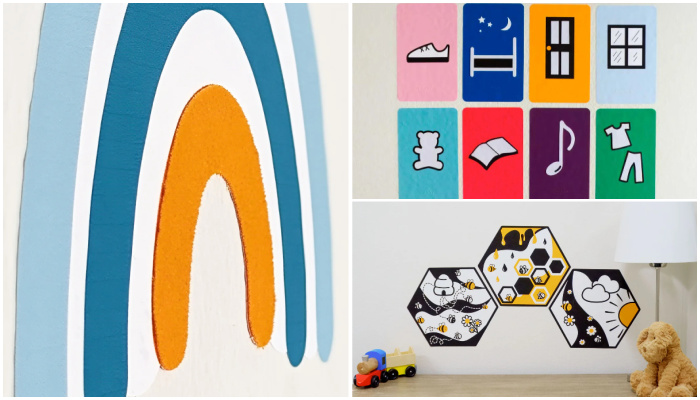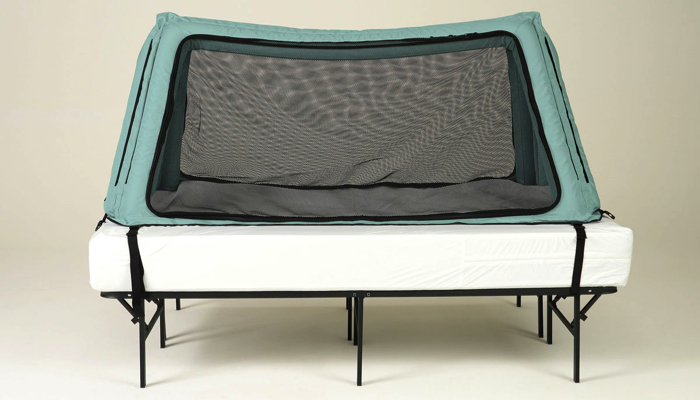Help! My Baby Won’t Sleep in a Bassinet

- One of the best ways to help your baby sleep in a bassinet is to establish a bedtime routine.
- It’s important that your baby sleeps in their bassinet during the day to establish helpful sleep habits.
- Swaddle blankets help newborn babies fall asleep because the snug fit gives them a womb-like comfort.
Imagine you’ve just brought your newborn baby home from the hospital. Everything is going smoothly and you’re putting baby to bed. Then, just as you lay them down and walk away, it begins—the cry that demands being held.
If you’re like most parents, you’ve probably tried everything to help your baby sleep in their bassinet. But nothing seems to work. You’ve tried numerous sleep solutions—rocking, singing, even playing white noise—and sleep training methods, but nothing seems to soothe your fussy baby and help them fall asleep.
It’s tempting to just give in and pick them up, but you also know that you need to get some sleep too. So what can you do to get rid of the sleepless nights?
If your baby won’t sleep in a bassinet, don’t fret. There are a variety of strategies to help your baby fall asleep in a bassinet.
Why Won’t My Baby Sleep In a Bassinet?
There might be a number of reasons why your baby won’t sleep in their bassinet. Here are few:
1. Your baby is used to sleeping in your arms.
We know that a squishy, sweet newborn is difficult to put down. And everyone indeed loves to hold a sleeping baby. However, babies who often go to sleep while being held will likely find it difficult to fall asleep without that comfort.
This is something you’ll want to avoid if at all possible. Getting your baby to sleep without being held can be extremely difficult after habits are created.
For this reason, it’s important that your baby sleeps in their bassinet during the day to establish helpful sleep habits. Try to put your little one down for daytime naps in their bassinet. If you let your newborn consistently fall asleep in their bassinet it will become a place of comfort.
2. Your baby is uncomfortable.
It’s possible that your little one doesn’t want to sleep in the bassinet because they are uncomfortable. A dirty diaper, hard mattress, or a scratchy swaddle or receiving blanket will wake a sleeping baby.
If you find that your baby wakes right after you put them down to sleep, check their bassinet and diaper for any irritation. It’s also important to check your newborn’s toes and fingers as long hairs tend to get wrapped around these tiny areas. If these hairs go unnoticed, they can cut off your baby’s circulation to that area.
3. Your baby is overstimulated.
It’s not uncommon for newborns to be overstimulated before bedtime. Too much activity or stimulation right before sleep can cause your baby to have a harder time falling asleep. An overtired baby will be overly fussy and will stay awake for long periods.
Establishing a bedtime routine is one of the most common sleep solutions. An overtired newborn baby is usually in need of soothing patterns and routines. These routines cue them that bedtime is coming and help your baby sleep soundly.
4. Your baby is sick.
If your baby has only recently refused to sleep in the bassinet, it might be due to illness. Check for a stuffy nose, coughing, or other signs of illness. Many newborns also have gas and tummy troubles which can keep them awake at night.
If this is the case, help your newborn sleep by relieving pain or supporting their respiratory system. To relieve congestion, hold your baby upright in a steamy bathroom.
5. Your baby’s startle reflex is waking them.
The startle reflex in babies might be one of the most difficult obstacles to sound sleep. If your newborn only sleeps for short periods, despite all the solutions you’ve tried, this might be the culprit behind why a baby won’t sleep.
This reflex is also known as the Moro reflex. If you’ve ever seen your little one jump or move in their sleep, this is why. Infants usually grow out of this by six months old.

Why Is It Important That Babies Sleep in a Bassinet?
Where and how babies sleep are important factors for their safety and development. Here’s why a bassinet is a good choice:
1. It’s safer for your baby.
It’s important that babies sleep in their bassinet so that they have a safe sleep space. According to the CDC’s safe sleep guidelines, babies should sleep in the bassinet or crib rather than in bed with their parents. This recommendation is based on research that shows that babies who sleep in the same bed with their parents are at a higher risk for SIDS.
2. It helps your baby to establish healthy sleep habits.
When babies fall asleep in the arms of their parents, they might develop a reliance on being held to stay asleep. Using a bassinet for your baby’s sleep periods day and night helps them make the connection between their bassinet and sleep.
This association will help your baby to fall asleep easily at night. Additionally, it will help your baby to learn to self-soothe and put themselves back to sleep if they wake in the night. Self-settling is a crucial skill for better sleep.
5 Tips to Get Your Baby to Sleep in a Bassinet
If your baby won’t sleep in the bassinet, try these tips:
1. Establish a bedtime routine
One of the best ways to get your baby to sleep in a bassinet is to establish a bedtime routine. Here are some helpful things to include in a bedtime routine:
- Bath
- Singing lullabies
- Reading a book
- Baby Massage
- Calming essential oils
Even if you are pressed for time on certain nights, it’s important to keep the routine the same, even if it’s an abbreviated version. It’s worth taking the extra few minutes to ensure your baby is calm and ready for sleep.
2. Make sure your baby’s sleeping area is comfortable
A comfortable baby is a happy baby. When getting your little one to sleep in a bassinet, you want to make sure they’re as comfortable as possible. A big part of that is creating a cozy sleeping space in their bassinet.
Here are a few tips to help you create a comfortable bedtime environment for your baby:
- Use a firm bassinet mattress that fits snugly. This will provide support for your baby’s developing spine.
- Dress your baby in light, breathable clothing to prevent them from getting too hot or sweaty.
- Keep the bassinet free of pillows and stuffed animals, which can pose a suffocation hazard.
- Have a few soft blankets on hand to swaddle your baby in for added warmth and comfort. This also reduces the number of jerky movements your baby makes while sleeping.
3. Avoid overstimulation before bedtime
Babies that are overstimulated tend to be fussy and hard to settle down. An overstimulated baby won’t go to sleep even when tired. They might also have disrupted sleep cycles and wake frequently at night.
If your baby won’t sleep at night and acts overtired, be sure you are establishing good sleep habits during the day. A baby who gets more sleep during the day will likely sleep longer at night. And likewise, an overtired baby who misses naps will likely wake often at night.
Dimming overhead lights and avoiding stimulation from computer screens or television can help avoid an overstimulated baby. Try turning off electronics and turning down the lights an hour before your baby’s bedtime.
4. Swaddle your baby
If your baby won’t sleep in their bassinet, you might try swaddling them. This will help them settle down, fall asleep quickly, and reduce their startle reflex. Swaddle blankets help newborn babies fall asleep because the snug fit gives them a womb-like comfort.
To swaddle your baby, you can use either a large receiving blanket or a special swaddle wrap. The swaddle should wrap just snug enough to keep their arms from jerking. However, the swaddle should not be so tight that you cannot fit two fingers under the top of the swaddle.
5. Lay them down awake
Many parents enjoy rocking or nursing their newborns to sleep. But sometimes this creates habits that prohibit self-soothing. Try not to let your baby fall asleep while rocking or nursing them. Instead, lay them down to sleep in their bassinet while they are tired but still awake.
Letting your baby fall asleep on their own will create a healthy sleep pattern. There are many sleep training methods that can help guide you through this process.

Safety Rules for Using Bassinets
When preparing your baby’s bassinet or crib, be sure to follow safe sleep guidelines.
- Your baby’s crib or bassinet should have a firm mattress and be free of all loose blankets, toys, or pillows. (Also make sure your baby’s head is free from the swaddle wrap. Swaddle wraps should start just below the shoulders.)
- Position your baby on their back in the crib to go to sleep.
- Do not use sleep positioners. (Studies show that using sleep positioners can pose a suffocation risk.)
- Do not bed share with your baby. Keep them in their bassinet or crib through the night.
FAQs
Should a Newborn Sleep in a Bassinet During the Day?
In order to help your baby sleep in the bassinet at night, it’s important to let them nap in the bassinet during the day. Letting your baby nap in the bassinet gives them a consistent routine.
It’s also the safest place for a sleeping baby. Swings, cushions, or car seats are all unsafe places for your baby to nap. Placing them on their back to sleep in their bassinet ensures they are safe from falls, suffocation, or other dangers.
Using a portable bassinet will allow you to move it around the house during the day. This way your baby can still be near you while sleeping in their bassinet.
How Can I Get My Baby to Sleep in a Bassinet After Co-sleeping?
If your baby won’t sleep in their bassinet after co-sleeping, this can be a bit of a challenge. There are several things you can do to ease into the transition.
- Create a consistent routine for bedtime to help your baby sleep soundly. If you already have a routine, keep the same routine as you transition so that too much doesn’t change at once.
- Put your baby down drowsy, but awake. This will teach them to begin to self-soothe and learn to fall asleep without you.
- Stay in the room until your baby falls asleep. Your baby might need this extra support and reassurance to help with the transition at first. You might try gradually leaving the room earlier over the span of a week.
- Gradually moving your baby’s bed away from your bed will also help promote independence.

Related Posts

Parenting
Sensory Wall Art: 5 Tips to Create a Room Your Blind or Low-Vision Child Will Love
Even if your child can’t see their surroundings, personalizing and decorating their room with thoughtful, sensory-friendly design can make a big difference in their confidence, independence, and joy.

Sleep, Special Needs
Safe Place Bedding Travel Bed Review
Traveling with a special needs child can be stressful! Having a safe, durable, and easy to use travel bed can make traveling so much easier!

Parenting
4 Tips to Manage Twins Alone as a Single Parent
Taking care of twins alone as a single parent can feel overwhelming. Learn practical ways to help lighten the load.